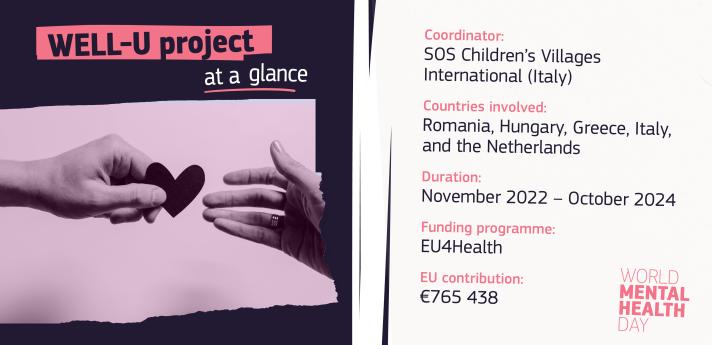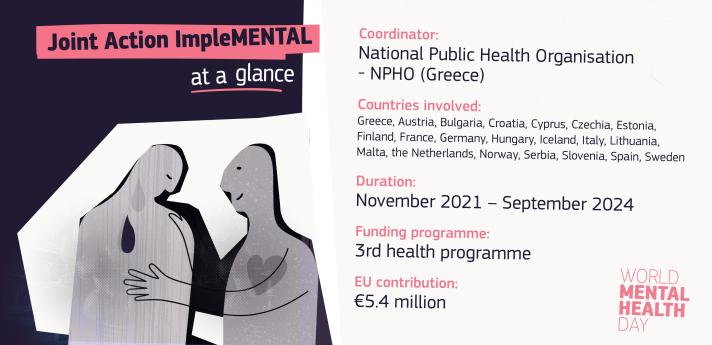
The Well-U project has been promoting the mental health and psychosocial wellbeing of refugee children and their caregivers through lay professionals amidst the displacement crisis in Ukraine caused by Russia’s war of aggression.
Migrants are exposed to a higher incidence of mental health distress because of the adverse experiences they might have faced prior, during or after their migration process. The situation of refugees displaced by Russia's war of aggression confirms this tendency. Yet, public health systems are too often ill-equipped, both in terms of capacities and resources, to meet these needs.
This is where the WELL-U project has stepped in to introduce universal preventative mental health and psychosocial support (MHPSS) measures that can be carried out by lay professionals* instead of specialised mental health professionals. Lay professionals range from staff of local Non-Governmental Organisations (NGOs)/Community-Based Organisations (CBOs) working with refugees and local reception centres to teachers, educators, cultural mediators, health and social workers, and peer refugees themselves.
Through the use of evidence-based tools and interventions (e.g. Problem Management +), WELL-U has made mental health support more accessible, less expensive and better integrated within the current life circumstances of individuals facing adversity; thus at the same time helping reduce the burden on institutions specialised in providing mental health support. Mental health care and guidance has been given to refugee children and their caregivers in Italy, Greece, Hungary and Romania.
Over the last two years, Well-U has organised 27 sessions in 7 countries, training 255 lay people, 45% of whom are Ukrainian. The project has also reached out to 880 children and adolescents, 80% of whom are Ukrainian, to equip them with measures for mental health and psychosocial support (MHPSS) to mitigate adverse effects of the war. In addition, several Ukrainian mental health professionals have become very good representatives of their community and taken active part in trainings and awareness-raising activities.
Well-U is one of 4 EU4Health mental health projects offering support to the displaced people of Ukraine and it has worked to build synergies with the national offices of the Red Cross, European Alliance against Depression (EEAD) network and other EU-funded projects such as U-Rise and MESUR to strengthen the network of mental health support carers and professionals.
*Lay professionals are non-professionals who hold professional knowledge about a subject.
The Joint Action (JA) ImpleMENTAL has brought together 18 EU countries, Iceland, Norway and Serbia and over 40 stakeholders working in the mental health sector to implement two best practices: the Belgian mental health reform and the Austrian best practice on suicide prevention (SUPRA). It has successfully achieved the implementation of 25 pilots in 20 countries.
Inspired by the Belgian best practice, the JA has contributed to mental health community-based transitions across 11 pilot countries, such as improving the visibility and perceptions of mental health networks in Slovenia; implementing a mental health reform towards community-based care in Lithuania; transitioning to community mental health residences in Cyprus; definining of individualised care plans in community mental health services in Spain.
The SUPRA Austrian best practice has been implemented through pilots in 17 countries, setting up national action plans to address suicidality. In the last 3 years, 14 new or renewed suicide prevention plans were formulated, and 9 on-site training sessions have involved 1000 beneficiaries. The multi-stakeholder approach has been a key element of the project, with collaboration and collective efforts of the different actors involved (including people with lived experience) pointing out efficient interventions to advance mental health care.
At the Joint Action’s closing event in Greece, Marina Zanchi, Director of HaDEA, underlined:
“JA ImpleMENTAL has clearly shown to us the importance of multi-stakeholder engagement to align mental health interventions with patient needs, the relevance of community-based approach in mental health care and the significance of peer-learning and capacity-building while dealing with uncertainty.”
This is best exemplified by the relationship between the JA members and the Regional Office of the World Health Organisation in Europe (WHO/Europe). The latter has also played a crucial role in supporting all EU countries with thematic workshops on a human rights-based approach in delivering care or fighting stigma for patients, carers and professionals as well as increasing EU countries’ capacity to address and implement major institutional and policy changes. The JA has been a facilitator for the introduction of new legislations in Cyprus, Lithuania and Greece.
Moreover, JA ImpleMENTAL has created successful synergies with other EU4Health projects, including the new JA MENTOR*.
JA ImpleMENTAL will be present at the European Public Health Conference (November 2024), where HaDEA will be hosting a stand on EU funding and a session during the pre-conference programme.
*JA MENTOR was launched on 7-8 October in Riga. It will aim to support EU countries to implement resilient systems that adopt the “Mental Health in All Policies” principle. The JA will also address stigma and the needs of vulnerable groups, as well as the empowerment of people with lived experiences in their access to quality care.
Relevant links
Mental health policy
Healthier Together initiative
EU Solidarity with Ukraine
Background
Since 2003, the first, second and third health programme have implemented EU health policy.
EU4Health is the fourth and largest of the EU health programmes. The EU4Health programme goes beyond an ambitious response to the COVID-19 crisis to address the resilience of European healthcare systems. The programme provides funding to national authorities, health organisations and other bodies through grants and public procurement, contributing to a healthier Europe.
HaDEA manages the vast majority of the total EU4Health budget and implements the programme by managing calls for proposals and tenders from 2021 to 2027.
Details
- Publication date
- 10 October 2024
- Author
- European Health and Digital Executive Agency
- Programme Sector
- Health
- Programme
- EU4Health
- Tags
- HealthUnion
- Public health


